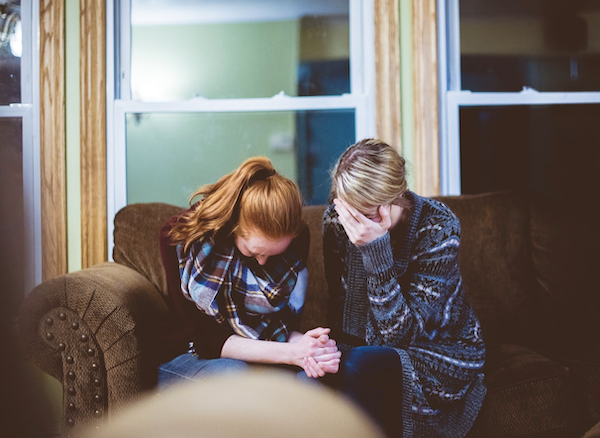What do you do, what do you say when someone you know has been struck by loss or tragedy? Unfortunately, over the past two weeks, I’ve had to ask myself these tough questions.

The cellphone rang, the distress palpable in my wife’s voice, “Greg, there’s so much bad in the world. There’s too much pain.” I understood, twice that week we received terrible and heartbreaking news impacting people we know and love. Both events shocked friends and neighbors into asking, “How can we help? What can we do?”
What not to do when someone’s grieving
In that moment on the phone I made a mistake, I did the guy-thing: I tried to explain away my wife’s sadness.
How do you think that worked out for me?
After a long pause that seemed to go on forever, her voice said clearly, “I was just telling you how I felt.”
Ouch.
Determined to avoid this rookie mistake again when someone I know is grieving, I spent time thinking about what I SHOULDN’T do:
1. Say, “Please call me, I’m here for you.” You know what, when a person is hurting so badly that they can’t even talk, they’re not thinking straight. So, although it will make me feel good to offer the help, I shouldn’t expect my phone to ring.
2. Say, “It will be alright, there’s a reason for everything” and then proceed to rationalize away their pain. Have you ever “comforted” someone fresh from the loss of an aged parent by saying, “Wow, 85 years old! At least they lived a long life.” Or, to a friend reeling from a failed marriage, “Don’t worry, you’ll find someone else.” Or, confronted with someone mourning the loss of a beloved pet, “Don’t worry, I’m sure you’ll see him/her again.” If you haven’t, I have.
3. Do nothing. Maybe I didn’t know what to say, what to do, or, worse yet, was too consumed with my own busyness, but doing nothing to console a friend is embarrassing.
What you should do, when someone’s grieving
But now I understand why stepping into someone else’s grief is so difficult. Witnessing their pain makes me face the stark reality that my life is not under my control either. Bad things happen to good people, often with no explanation or observable reason. And this reality causes me to ask, “Oh my gosh, what if that happens to me?!”
So, like a lot of things in life, my gut response is to make it all about me – I absorb my friend’s grief and my neighbor’s impossible circumstances and make it all about my own uncertainty, my fears, and my concerns. Fear has a nasty way of doing that.
But now I know fear’s playbook, and its gig is up.
Now, I chose to offer solace. I chose to offer comfort. Even when a little bit of each is all I can muster, the gift of a purposeful presence can go a long way.
“Weep for those who weep, mourn for those who mourn.” Rom 8:12
I’ve dubbed my new strategy, the “Show-Up and Shut-Up” strategy.
Because sometimes the best thing I can do is to SHOW-UP and give a hug, hold a hand, bring a meal, buy groceries, clean an apartment, run errands, or walk a dog. I’m not going to wait to be asked, because people in pain don’t know what to ask for.
I remind myself that I must also SHUT-UP. I’m growing more comfortable with not knowing what to say in the face of grief. If all I can utter is, “I don’t know what to say, but I am so sorry for your loss,” and then offer a big hug, well, that’s ok too. It’s important to give those who grieve the space and time to grieve, in the present. I shouldn’t try to minimize what they’re feeling by filling the quiet with my rationalized vision of a future that they’re unable to see.
I wish I had the mindfulness to offer solace, comfort and kindness in the past. But the sad truth is I know I will have plenty of chances to make up for lost opportunities in the days to come.
Be Wise and Successful…
1. Show-up, don’t solve. Show-up and do whatever you can. Don’t try to solve their hurt, because you can’t.
2. Be quiet, just listen. Hold-back from filling the air with your words, simply be present, and lend an ear to anything that’s said. Don’t offer your opinion, unless you’re specifically asked a question. Just let them talk.
3. Be brief, prepare. Keep your encounters brief so that you can maintain your frequency. Prepare for your encounters, so that you can be your best self for your friend.
Do you want to live a happier, more successful life? I’m Greg, that’s my passion, and that’s what I explore on my blog. Read More…

